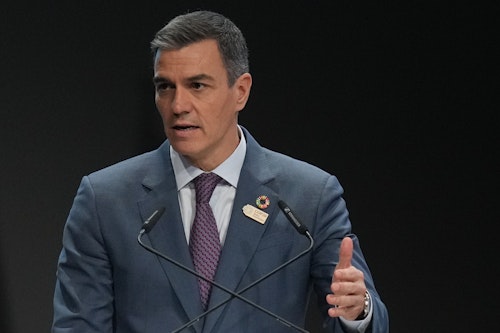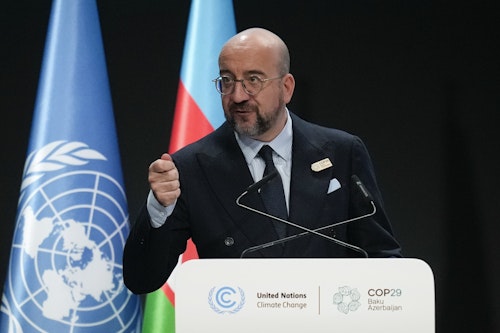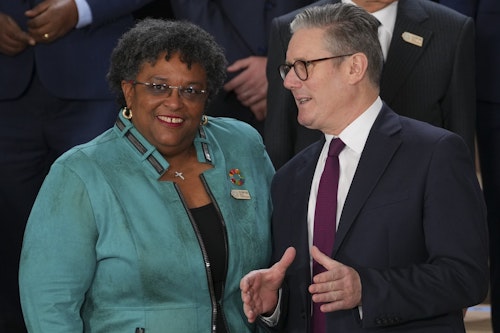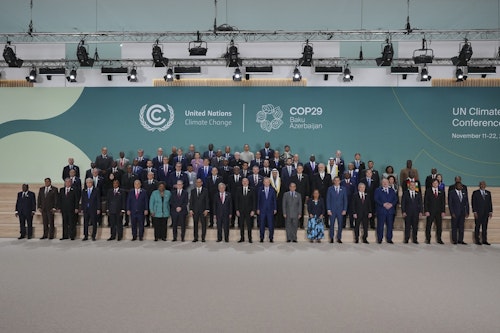Euronews Green brings you the latest updates from the UN climate conference in Baku, Azerbaijan.
Follow along with our live coverage of COP29 here. From our team at home and in Baku we'll be sharing the biggest news from day two of the UN climate summit.

 ${title}
${title}
Live ended
We're wrapping up our live coverage for the day as things begin to slow down in Baku. In case you missed it, here's a quick summary of the biggest stories from today.
- World leaders stepped up on the stage in Baku to address the summit. Some outlined commitments while others spoke of the devastating impact climate change has already had on their country. That included Spanish PM Pedro Sanchez who called out those rejecting the "terrible truth" that climate change kills.
- The UN confirmed that the total provisional number of participants in COP29 is 66,778 - a significant drop from the 83,884 last year in Dubai.
- Azerbaijan’s President Ilham Aliyev, told COP29 that oil, gas and other natural resources are a "gift of god" and countries shouldn't be blamed for having them.
- UN chief Antonio Guterres called the last year a "masterclass in climate destruction". But, he added, there are still reasons to be hopeful.
- European Council President Charles Michel told COP29 that we can "count on the EU". While the bloc is cutting emissions at a rapid rate and contributing to climate funds, there's still more to be done.
- The UK made an ambitious pledge to cut greenhouse gas emissions by 81 per cent by 2035. It has been welcomed as a sign of climate leadership at a summit where many are absent.
- The US announced that for the first time ever big oil and gas producers will have to pay a fee for the methane they emit. It comes as Biden nears the end of his presidency and some wonder whether the new rule will survive the Trump administration.
As big names head home from Baku, now is when negotiators will start to get down to the real details of these talks. It's goodbye from us for now but make to join us tomorrow for day three of COP29.
What is Article 6 and why is it controversial? Campaigners react to adoption of carbon credit rules
A little-known part of the Paris Agreement to curb global warming has been thrust into the spotlight at COP29: Article 6. This section of the deal concerns a carbon markets system, which would enable nations to produce pollution if they offset emissions elsewhere by buying carbon credits.
It has been a big sticking point at previous climate summits, as some parties fear it risks undermining the urgent need to cut global emissions. In a bid to make progress this year, a technical committee was tasked with writing the rules to get the carbon markets mechanism off the ground.
Last night, this version of Article 6 was quickly adopted by countries in what COP29 lead negotiator Yalchin Rafiyev called an early “breakthrough” for the summit.
Are carbon markets a climate solution or excuse for more pollution?
Carbon markets are one step closer to being part of global climate plans after a speedy COP decision.
‘Crazy young penguin’ travels to Australia from Antarctica. Is climate change to blame?
An emperor penguin has been discovered waddling on an Australian beach, about 3,500 kilometres from its Antarctic home, according to a statement from the Western Australian state’s government. Though Australia is known for its exotic array of animals - and there is a colony of 30cm high 'little penguins' in St Kilda, Melbourne - this is the first known sighting of an emperor penguin in the country.
So how did it get there?
Emperor penguins are the tallest and heaviest of all living penguins and are usually found only in the Antarctic. Record-low sea ice levels in the Antarctic may have driven this particular penguin far from home.
How did an Antarctic penguin end up in Australia?
The runaway emperor penguin was seen attempting belly slides on the sands of an Australian beach.
'Terrible truth' that climate change kills is now clear says Spanish PM
Prime Minister of Spain Pedro Sánchez has addressed COP29 after devastating flooding killed more than 200 people in southern and eastern regions of the country late last month.
He called out deniers who don't accept the "terrible truth that science has been pointing out for far too long" that climate change kills.
"Last year alone it killed more than 300,000 people and has just contributed to the death of more than 220 of my compatriots in Spain. The greatest natural disaster in our history," Sánchez said.
"A disaster that, according to early research, would have been less likely and less intense without the effect of climate change." He added that the planet was giving us "increasingly clear" signals.
Read more: Why was Valencia flooding so deadly, did warning texts come too late and what’s the climate link?
"If we do not act in the near future, our countries will suffer more droughts, more heat waves, more torrential rains, more fires and diseases. And many economic sectors will collapse, hundreds of cities and towns will become uninhabitable."
Sánchez emphasised that the existential threat has now moved from academic articles to "our televisions and windows".
"We cannot turn around and walk backwards, going back to oil, to combustion vehicles, to deregulation, just to keep the rich even richer, knowing that this formula will lead us all to disaster."
The Spanish Prime Minister added that Spain is already working to grow in a more sustainable and responsible way. He said the country has reduced its emissions by 40 per cent while at the same time being the OECD economy that has grown the most and created the most jobs in recent years.
"That is why I beg you not to listen to those who say that the ecological transition is incompatible with the well-being of nations or that it is bad for the middle and working classes because it is not true."

Spanish Prime Minister Pedro Sanchez speaks at COP29. Credit: AP Photo/Rafiq Maqbool
Can we count on the EU?
The EU is among those making the most progress on tackling the climate crisis. Last year it achieved an 8.3 per cent drop in greenhouse gas emissions - a reduction the scale of which hasn't been seen since the COVID-19 pandemic in 2020.
In total this means that emissions in the EU are now 37 per cent lower than in the baseline year of 1990. But this is still a long way off from the 2030 target of cutting greenhouse gas emissions by at least 55 per cent.
Read more: Europe’s greenhouse gas output down over 8% in a year
The European Environment Agency says this is mainly down to a decline in the burning of coal combined with a growth in renewable energy sources like wind and solar.
It also found, however, that existing climate measures would result in a 43 per cent drop in emissions by 2030. Even additional "planned but not yet launched" measures submitted by 22 member states, would only cut emissions by 49 per cent.
Michel also posed the EU as a friend to poorer nations calling for rich countries to step up on climate finance. The bloc and its member states are the biggest providers of climate finance in the world. Last year the EU contributed a total of €28.6 billion from public sources and mobilised an additional €7.2 billion in private finance.
But it was only last year that the bloc dropped its opposition to a fund to pay for the damage done by climate change.
'You can count on the EU' says European Council President
European Council President Charles Michel has taken to the stage at COP29.
"The world is on a razor's edge," he told the summit. "Violent imperialism, vengeance and eternal collective punishment are poisons that endanger us all."
"Each week somewhere in the world we have to deal with the devastating consequences of climate change. This climate threat is existential for the human race, and we, the human race, bear responsibility for this war against nature."
Some including developed nations, he added, bear this responsibility more than others.
Michel said the Paris Agreement should be a "peace treaty with nature" and the principle of cooperation should govern how it is implemented.
"You can count on the European Union," he added saying that the bloc was stepping up to the plate to deliver $31 billion in funding.
"That is more than our fair share and we are calling on everyone to follow our example," Michel emphasised including fellow G7 nations and emerging economies.
He stressed the need to broaden the base of donors and have more contributors to climate funds as a prerequisite for achieving an ambitious new target.

President of the European Council Charles Michel speaks during a plenary session at COP29. Credit: AP Photo/Rafiq Maqbool
What are NDCs?
Nationally determined contributions or NDCs are climate action plans that outline how countries will contribute to temperature goals outlined in the Paris Agreement. They detail efforts like how countries are going to reduce national emissions and adapt to the impacts of climate change.
The Paris Agreement requires countries to submit new NDCs every five years which should reflect their "highest possible ambition" and be in line with the latest climate science. These plans therefore need to get stronger with each round of NDCs.
You might see some of these national climate plans announced at COP29 as the next round of NDCs - with target dates in 2035 - is due in early 2025.
UK has potential to become 'true global climate leader' - but it isn't there yet
More positive but hesitant responses to the UK's climate plan are coming in. Though the goal is no doubt ambitious, there are concerns that the country is still way off track in meeting its current emissions targets.
"Getting the UK’s more ambitious climate goals out of the door early is a good move by Keir Starmer as it shows willingness to show his cards on an international stage - this is much needed to encourage others to do so," says Kate Blagojevic, associate director of Europe at climate NGO 350.org.
"The UK has the potential to become a true global climate leader on the world stage but isn’t quite there yet. For Keir Starmer to claim the coveted mantle in time, the more ambitious emissions reduction targets need to get back on track and be delivered on time without relying on CCS and nuclear power."
The UK is not on track to meet its existing NDC target to cut 68 per cent of emissions by 2030. The government now needs to outline exactly how it plans to meet the new, more ambitious goal.
UK 'setting a bold bar for climate action at COP'
Reactions to the UK's climate plan have been pretty positive but there are still some reservations.
"With a planet battered by severe floods, storms, and heatwaves—and a climate denier elected to the White House—the UK is responding by setting a bold bar for climate action at COP this year," says Action Aid's senior climate resilience specialist, Zahra Hdidou.
Hdidou adds, however, that this commitment risks being undermined by costly carbon capture projects - a "flawed solution" and billions in public subsidies for fossil fuel firms.
The UK PM emphasised several times that he "is not going to tell people how to behave". But independent scientists for the Climate Change Committee say it will be tough to reach these goals without changing the way that people live.
The independent body has said that more than any commitment, what is needed now is action.
UK pledges 81 per cent cut to emissions by 2035
The UK has pledged to cut emissions by 81 per cent compared to 1990 levels by 2035.
Prime Minister Keir Starmer confirmed the commitment at COP29 in Baku today which is in line with recommendations from the Climate Change Committee - the UK's independent public body on climate. Experts say it could be one of the strongest NDCs to come from the summit and is a sign of climate leadership from the country.

Barbados Prime Minister Mia Mottley, left, and United Kingdom Prime Minister Keir Starmer arrive for a group photo at COP29. Credit: AP Photo/Peter Dejong
"To be a credible global leader on climate, the UK needs to be driving courageous climate ambition at home," says CEO of Climate Group Helen Clarkson.
"In this context, an 81 per cent reduction in emissions is a strong signal from the UK Government at a COP that is sorely lacking global leadership."
NDCs have also been presented by others including host country Azerbaijan, the United Arab Emirates and Brazil. But NGOs have said these are pretty weak and not in line with what is needed to prevent catastrophic global warming.
US introduces 'methane fee' for big oil and gas producers - but how long will it last?
For the first time ever, oil and gas companies in the US will have to pay a fee if they emit more than a certain amount of methane.
This 'methane fee' was finalised today by the Biden administration as his term comes to an end. It will start at $900 (€847) per metric tonne of methane emitted each year and increase to $1,200 (€1130) in 2025 then $1,500 (€1413) in 2026.
Methane is a far more potent greenhouse gas in the short term than carbon dioxide. It also makes up a third of all greenhouse gas emissions. The oil and natural gas sector is the biggest industrial source of methane emissions in the US and cutting these emissions could have a major impact on global warming.
The Environmental Protection Agency rule is set to be announced at COP29 in Baku today. With a Trump presidency looming, however, it could be one of the dozens of environmental regulations he plans to repeal once he takes office
Food can be a bit hit-and-miss at COP. But with long days ahead for many, a source of caffeine is also a top priority.
Euronews Science Correspondent Jeremy Wilks has been on the hunt for the best cup of coffee at the conference. And he thinks he might have found it.
Who has the best coffee at COP29? Türkiye ? pic.twitter.com/nrVpAIaGV6
— Jeremy Wilks #climate #science #space #tech #green (@WilksJeremy) November 12, 2024
Just 8 out of 78 world leaders at COP29 are women
You might have noticed something about the family photo from this morning. Just eight of the 78 world leaders in Baku for these climate talks are women. This isn't a new trend.
At COP28 last year, women were 15 of the 133 world leaders present and 34 per cent of national delegates. Only 2 per cent of delegations had a gender balance in their ranks.

World leaders gather for a family photo at COP29. Credit: AP Photo/Peter Dejong
"Once again, women are being silenced and cut out of critical negotiations around the climate catastrophe and the future of our planet," says Helen Pankhurst, senior advisor on gender equality at CARE International UK.
"Women and girls are contributing the least to the climate crisis, yet world-over they are paying the highest price. If we want to see a fair outcome from climate negotiations, which make a genuine difference, we’ve got to start seeing women represented equally at the very highest levels."
Dutch appeal court overturns landmark Shell climate ruling
Back in the Netherlands, a landmark ruling which ordered oil company Shell to cut its carbon emission by 45 per cent by 2030 compared to 2019 levels was overturned on Tuesday.
It is a major blow for the Dutch branch of the environmental group Friends of the Earth which originally hailed the 2021 decision as a victory for the climate.
The court said that Shell does have a duty of care to limit its emissions but it overturned the decision as it was "unable to establish that the social standard of care entails an obligation for Shell to reduce its CO2 emissions CO2 emissions by 45 per cent, or some other percentage."
"There is currently insufficient consensus in climate science on a specific reduction percentage to which an individual company like Shell should adhere," a written summary of the ruling reads. Presiding Judge Carla Joustra said Shell already has emissions targets that are in line with the demands of Friends of the Earth.
Shell welcomed the decision with CEO Wael Sawan saying it was "the right one for the global energy transition, the Netherlands and our company".
Donald Pols, director of Friends of the Earth Netherlands called it a "blow to communities all over the world who are bearing the brunt of climate inaction and greenwashing by corporations."
"Yet the ruling also gives hope - it confirms that corporations must respect human rights and that they bear responsibility for reducing emissions. No matter what, people are rising up and the era of corporate impunity is over. We urgently need an end to fossil fuels, no loopholes from carbon markets and false solutions and for big polluters to pay up.”
Protesters at COP29 call for an end to war in Gaza
Dozens of activists protested inside the COP29 venue in Baku, Azerbaijan on Monday, holding banners calling for climate justice and for nations to “stop fueling genocide.”
With many of them wearing Palestinian keffiyehs, protesters said there can be no climate justice without human rights.
Video. Protesters at COP29 call for an end to war in Gaza
Video. The activists held a quiet protest calling for a ceasefire in Gaza. They clutched banners reading: “Stop fueling genocide” and “Ceasefire now! End the o…
'Pay up' or pay the price of climate destruction, says UN chief
UN Secretary-General Antonio Guterres has told world leaders at COP29 that it's time to "pay up, or humanity will pay the price".
"The sound you hear is the ticking clock. We are in the final countdown to limit global temperature rise to 1.5 degrees Celsius and time is not on our side."
He reminded them that this year is set to be the hottest on record and has so far been a "masterclass in climate destruction".
"Families running for their lives before the next hurricane strikes. Workers and pilgrims collapsing in insufferable heat. Floods tearing through communities and tearing down infrastructure. Children going to bed hungry as droughts ravage crops," Guterres said.
"All these disasters, and more, are being supercharged by human-made climate change."
Echoing comments made by UN climate chief Simon Stiell yesterday, he told delegates that no country will be spared from the consequences of climate change as supply chain shocks raise costs, food prices rise from decimated harvests and insurance costs soar as homes are destroyed.
Guterres set out three main priorities: "emergency" cuts to emissions with the G20 leading, protecting people from the "ravages of the climate crisis" and "tearing down the walls" to climate finance.
The UN Secretary-General emphasised that developing countries must not leave COP29 "empty-handed".
"Climate finance is not charity, it’s an investment. Climate action is not optional, it’s imperative. Both are indispensable: to a liveable world for all humanity."
Euronews science correspondent Jeremy Wilks has been checking out a few of the country pavillions this morning at COP29. These small spaces within the summit are often used to host events or exhibitions. Here's what he found.
Is this the perfect eco dwelling ? #COP29 pic.twitter.com/G6oTFoFdUH
— Jeremy Wilks #climate #science #space #tech #green (@WilksJeremy) November 12, 2024
Great Britain pavilion at #COP29 pic.twitter.com/QoaD4bkc2e
— Jeremy Wilks #climate #science #space #tech #green (@WilksJeremy) November 12, 2024
Russian pavilion at #COP29 pic.twitter.com/uZEn7491Qn
— Jeremy Wilks #climate #science #space #tech #green (@WilksJeremy) November 12, 2024
World leaders take a 'family photo'
This morning all of the world leaders attending COP29 gathered for what is known as the family photo.

World leaders gather for a group photo at COP29 in Baku. Credit: AP Photo/Peter Dejong
WMO chief says rising temperatures are 'not a surprise'
Yesterday, the World Meteorological Organization warned that 2024 was on track to be the warmest year on record. The world is becoming dangerously overheated.
Euronews science correspondent Jeremy Wilks spoke to WMO chief Celeste Saulo in Baku to find out more.
"It's not a surprise. And we have to recognise that scientists have been marking this for many years — more than 30 years in fact — and that what is a surprise is the slowness to react," she said.
World is already becoming dangerously overheated, warns WMO
The latest WMO Global State of the Climate report for 2024 shows that the last decade was the warmest on record.
Catch up on what happened at COP29 yesterday
Missed all the action from day one? Check out our live coverage from yesterday to catch up.
COP29: What happened on day one of the UN climate conference?
Euronews Green brings you the latest updates from the UN climate conference in Baku, Azerbaijan.
Good morning and welcome back to our coverage of COP29.
After a first day dominated by fights over what should be on the agenda, today is the start of the World Leaders Climate Action Summit. Heads of state and government have arrived in Baku though this year there are fewer big names than at previous summits.
We'll be here and on the ground at COP29 keeping you updated with the latest from the UN climate conference.











